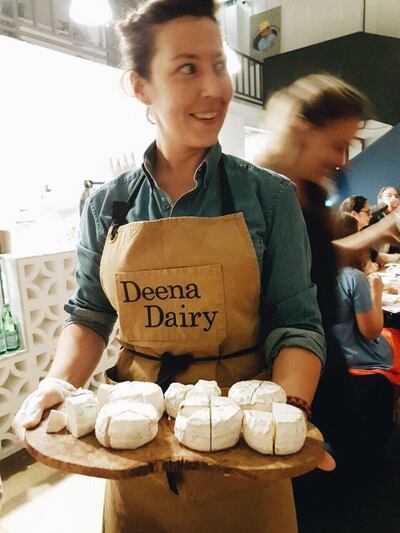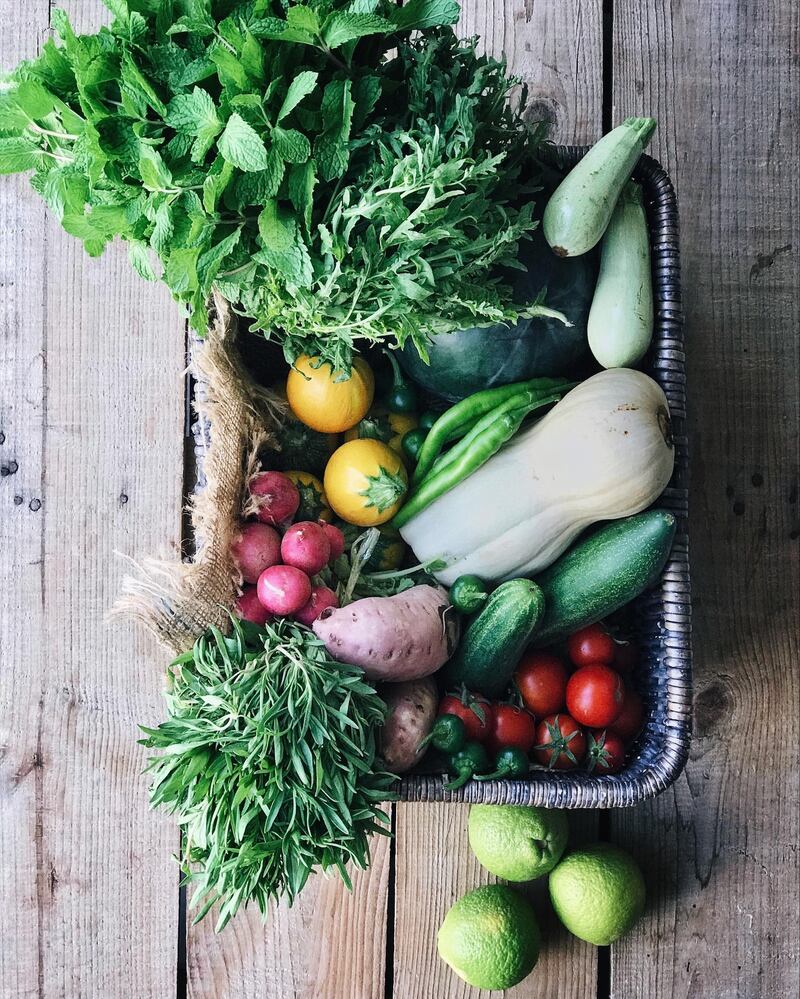Growing your own tomatoes; going strawberry-picking in the summer; making chutney in the cooler months; eating local; and cooking from scratch. While a fast-paced city existence certainly has its perks, who doesn’t absent-mindedly hanker after a rural idyll every so often? Living entirely self-sufficiently in the UAE might be something of a pipe dream, but from cultivating herb gardens on balconies and tending to vegetable patches to making cheese and supporting local producers, there are plenty of people here embracing the simple life, which means you can, too.
"I don't really know what I'd do if I couldn't garden," Carol Hyland says. She has spent the last 30 years in the UAE and has always grown her own plants, herbs and vegetables. "There's something about being outside and having my hands in soil that just appeals to me," Hyland says with a laugh. "People might think it sounds like I've gone mad, but if you asked me to choose between having a house or a garden, I'd choose the garden every single time." She hasn't had to make that decision yet, though, and at her home in Fujairah, Hyland has a flourishing garden abundant with flowers and plants, vegetables, salad leaves and cresses – all presided over by two resident tortoises. She is particularly well known for her micro cress and edible flowers, and supplies a number of locally based chefs with the likes of amaranth, borage, fenugreek and nasturtium.
While micro leaves require specific growing conditions and edible flowers demand a delicate touch, Hyland says that it's possible for even those who don't consider themselves green-fingered to grow their own herbs. "Provided you show them a little care and attention, and sow seeds at the right time of year, the likes of basil, mint, thyme, marjoram and lemon balm will flourish in small pots or window boxes out on balconies," she explains. "If you have a bit more space – and we're still talking balcony dimensions here – and equip yourself with good potting soil and decent-sized pots, and don't expose them to too much sunlight then tomatoes, cornichons, chillies and peppers will also flourish," Hyland says.
Viktorija Paplauskiene is another keen gardener; wherever she is living in the world – from London and Lithuania to the UAE – she always makes an effort to grow her own herbs and vegetables. “I suppose it makes me feel like I’m one step closer to running a farm in the countryside and operating my own guesthouse, which is my dream,” she says. “It’s also better for the environment; you reduce waste by only picking what you need and it’s incredibly satisfying when something flourishes despite the heat and humidity.”
For anyone who is keen to have a go – in however small or large a capacity – the recently launched, region-specific gardening handbook and journal My Arabian Almanakh provides an invaluable guide to doing so. The beautifully illustrated book is available through the Dreamwork Collective. Even if gardening doesn't appeal, you can still experience a certain sense of back-to-basics living through the way you shop, cook and eat. Someone doing just that is Carla Thetford, or Cheesy Carla as she is known on Instagram and at the Farmers' Market on the Terrace in Dubai, where she sets up a cheese stall every weekend during the winter months.
Thetford makes her own artisan cheese using goat milk that would otherwise be discarded. The idea came to her after realising that she was unhappy in her job and that something needed to change. “I decided that if I was to stay in the UAE, it had to be doing something I loved. Around the same time, I noticed that all the farmers here seemed to keep goats, but didn’t really utilise the milk,” she says. “My love of food and the fact that I’d sold cheese for quite a few years back in London, made me wonder if making European-style cheese was possible here.”

Despite being met with "plenty of negative feedback and a huge amount of laughter from everyone I asked", she eventually teamed up with family-run Deena Organic Farm and set to work. These days she produces a small but high-quality selection of cheeses, including an ashed goat cheese made using milk from the Deena herd, and an alpine-style goat and cow's milk mix, which is aged for a year and has a sweet, nutty flavour. Both of which and more can be ordered through the Deena Farm website.
The work is hard. When asked how difficult producing the cheese is, her reply comes quickly: “Right now, on a scale of one to 10, it’s 10.” However, it is also hugely rewarding. “So much about the process appeals to me: connecting with the environment and nature, working with the seasons and making something by hand. It’s also a huge education, not just for me, but also for the people working on the farm and our customers. I get to share this with them, so they can understand what goes into cheese-making, too,” says Thetford.
"Wherever you are in the world and whatever you're doing, your true self emerges," Fiona Archibold, a Dubai-based chef, food writer, cookery teacher and mother to 9-year-old twins, quietly asserts. For Archibold, who grew up in Ireland, where her father's vegetable patch fed the family and her mother baked all their bread, bringing an element of self-sufficiency to family life in the UAE is imperative. She points out that doing what you can to live a little independently – even just by cooking from scratch – not only educates and inspires children, but also helps them to develop a positive attitude towards food.
“It’s so important that rather than just being told to eat something because it’s good for them, children are part of the process of putting that meal together. If they see the raw ingredients, are involved in the preparation and sit down to eat with others, there’s a shared connection, a sense of memories made that you just don’t get otherwise,” she adds.
The ritual of making bread is an accessible place to start. This is thanks to the ancient processes involved, the investment of time and skill, and the sense of alchemy when raw, natural ingredients are transformed into something not only new, but also wholesome, sustaining and rewarding.When it comes to shopping for those ingredients, now is the perfect time of year to do so locally.
"I grew up in a village surrounded by dairy farms, where the cows were herded down my road twice a day to the milking parlour and our food was bought from the small village shop or dug from the garden," says Sally Prosser, a passionate advocate for supporting UAE farms and farmers. She says that not only does the way she chooses to buy her food here help maintain a sense of her roots, but it also provides peace of mind. "I try to shop [as I would anywhere] closest to the source with the least amount of middlemen. That way, I know where my food is coming from, how it is produced and the most benefit goes to the producer."
As a longtime champion of the Farmers’ Market, Prosser says that during the growing season – which is at its peak right about now – she buys all vegetables there, and over the years has got to know the farmers and artisans, and visited many of their farms. Her advice for anyone who wants to forge a connection with the food they buy and the people behind: be proactive. “Ask questions about where your food comes from and what’s in it. Consider the real cost of cheap food on our world and ourselves. Support people who really care about food; chatting with the farmers is one of the joys of living in Dubai.”
________________
Read more:
[ Recipe: Bake the perfect sourdough bread ]
[ My key ingredient: Gochujang ]
Essential food hacks to get you out of kitchen scrapes
________________






